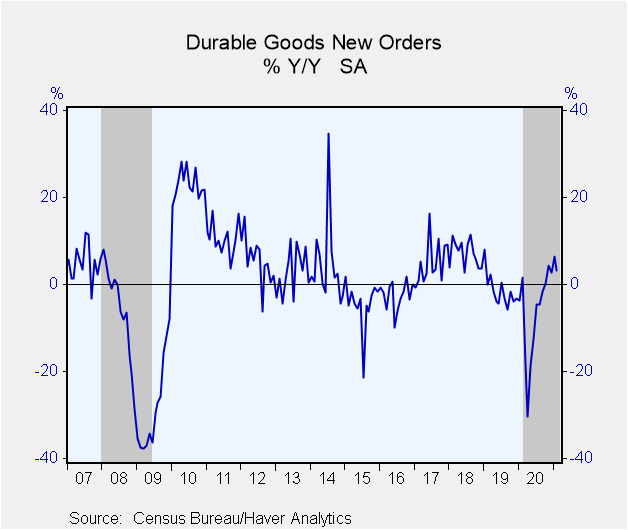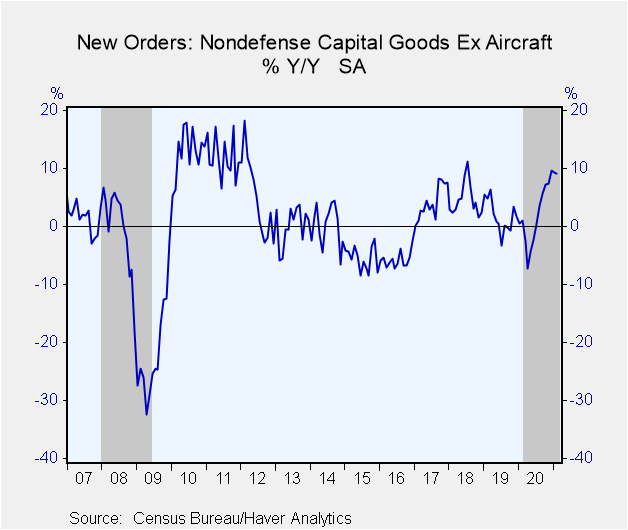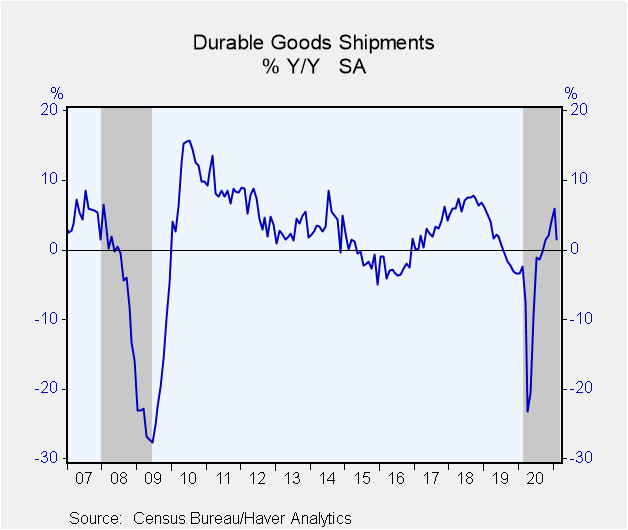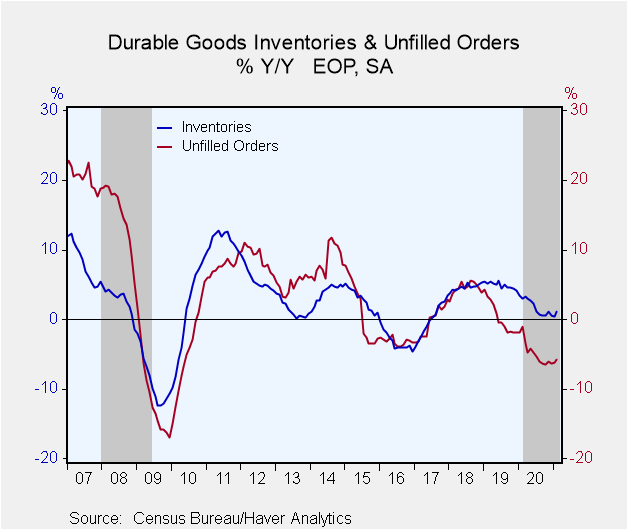 Global| Mar 24 2021
Global| Mar 24 2021U.S. Durable Goods Orders Decline Unexpectedly in February
by:Tom Moeller
|in:Economy in Brief
Summary
• Fall in orders is broad-based and likely reflects severe winter weather. • Orders of core capital goods reverse January gain. • Shipments weaken but order backlogs & inventories rise. Manufacturers' orders for durable goods declined [...]
• Fall in orders is broad-based and likely reflects severe winter weather.
• Orders of core capital goods reverse January gain.
• Shipments weaken but order backlogs & inventories rise.
Manufacturers' orders for durable goods declined 1.1% (+3.2% y/y) during February following a 3.5% January gain, revised from 3.4%. A 0.6% Improvement had been expected in the Action Economics Forecast Survey. The latest decline followed nine consecutive monthly increases.
Orders for nondefense capital goods excluding aircraft fell 0.8% (+9.1% y/y) following a 0.6% January rise, initially reported as 0.5%. The decline also followed increases in each of the nine prior months.
In the major categories of the report, primary metals and fabricated metals orders weakened, posting 0.5% (+6.4% y/y) and 0.9% (+6.5% y/y) declines, respectively. Machinery orders eased 0.6% (+5.9% y/y) while computer & electronic product orders weakened 0.5% (+8.9% y/y) for a second consecutive month. Orders for electrical equipment rose 0.2% (7.3% y/y) but transportation equipment bookings declined 1.6% (-5.8% y/y), reflecting an 8.7% drop (-3.0% y/y) in motor vehicle & parts orders.
Shipments of durable goods fell 3.5% (+1.5% y/y) following sharp increases in the prior two months. Shipments of core capital goods fell 1.0% (+7.7% y/y) in February, also after two months of strong gains. Shipments of transportation products declined 8.2% (-7.3% y/y) as auto and aircraft shipments fell sharply. Shipments excluding transportation weakened 1.2% (+6.1% y/y) after increasing in each month since May.
Unfilled orders for durable goods surged 0.8% (-5.8% y/y) in February after a 0.2% January increase. Order backlogs, excluding transportation, rose 0.9% (5.7% y/y), following nine consecutive months of gains.
Inventories of durable goods rose 0.7% (1.1% y/y) in February, after two consecutive monthly declines. Excluding transportation, inventories increased 0.7% (-0.0% y/y) and have been rising for six consecutive months.
The durable goods figures are available in Haver's USECON database. The Action Economics consensus forecast figure is in the AS1REPNA database.
| Durable Goods NAICS Classification | Feb | Jan | Dec | Feb Y/Y % | 2020 | 2019 | 2018 |
|---|---|---|---|---|---|---|---|
| New Orders (SA, % chg) | -1.1 | 3.5 | 1.2 | 3.2 | -7.1 | -1.5 | 7.1 |
| Transportation | -1.6 | 7.5 | 0.1 | -5.8 | -20.0 | -4.8 | 9.2 |
| Total Excluding Transportation | -0.9 | 1.6 | 1.8 | 8.2 | -0.3 | 0.4 | 5.9 |
| Nondefense Capital Goods Excl. Aircraft | -0.8 | 0.6 | 1.5 | 9.1 | 1.6 | 1.7 | 4.6 |
| Shipments | -3.5 | 1.7 | 2.1 | 1.5 | -5.2 | 0.8 | 6.6 |
| Nondefense Capital Goods Excl. Aircraft | -1.0 | 1.9 | 1.1 | 7.7 | 0.2 | 2.4 | 5.7 |
| Unfilled Orders | 0.8 | 0.2 | -0.2 | -5.8 | -6.4 | -1.8 | 3.9 |
| Inventories | 0.7 | -0.3 | -0.2 | 1.1 | 0.6 | 4.1 | 5.2 |
Tom Moeller
AuthorMore in Author Profile »Prior to joining Haver Analytics in 2000, Mr. Moeller worked as the Economist at Chancellor Capital Management from 1985 to 1999. There, he developed comprehensive economic forecasts and interpreted economic data for equity and fixed income portfolio managers. Also at Chancellor, Mr. Moeller worked as an equity analyst and was responsible for researching and rating companies in the economically sensitive automobile and housing industries for investment in Chancellor’s equity portfolio. Prior to joining Chancellor, Mr. Moeller was an Economist at Citibank from 1979 to 1984. He also analyzed pricing behavior in the metals industry for the Council on Wage and Price Stability in Washington, D.C. In 1999, Mr. Moeller received the award for most accurate forecast from the Forecasters' Club of New York. From 1990 to 1992 he was President of the New York Association for Business Economists. Mr. Moeller earned an M.B.A. in Finance from Fordham University, where he graduated in 1987. He holds a Bachelor of Arts in Economics from George Washington University.
More Economy in Brief
 Global| Feb 05 2026
Global| Feb 05 2026Charts of the Week: Balanced Policy, Resilient Data and AI Narratives
by:Andrew Cates










